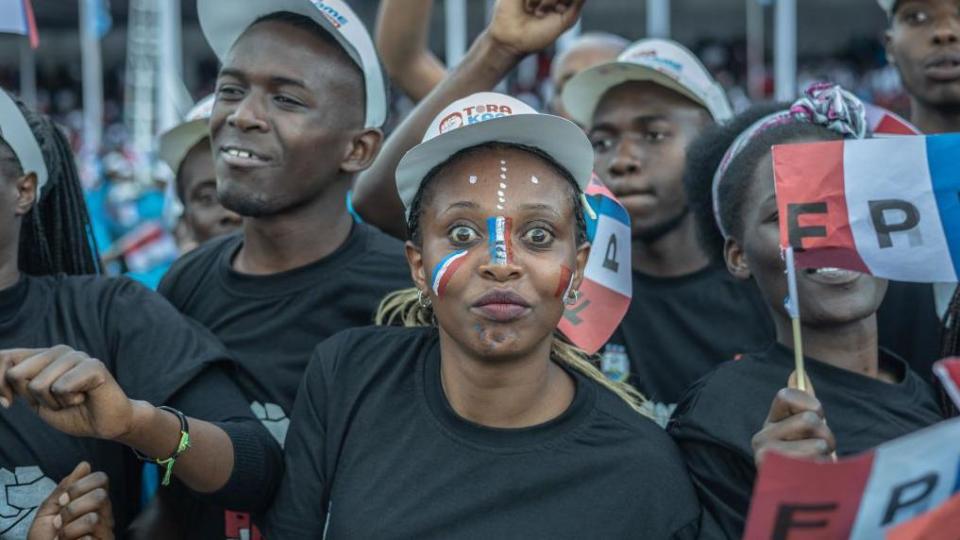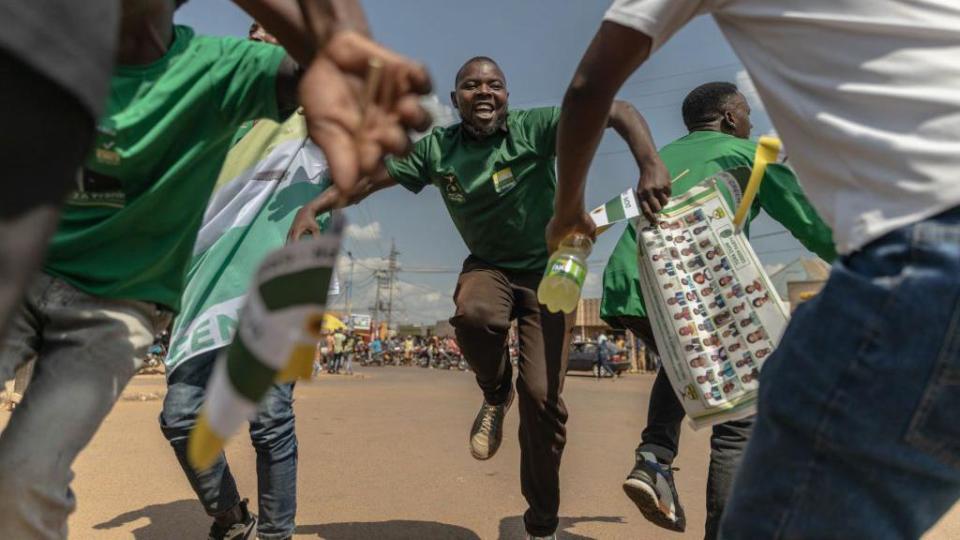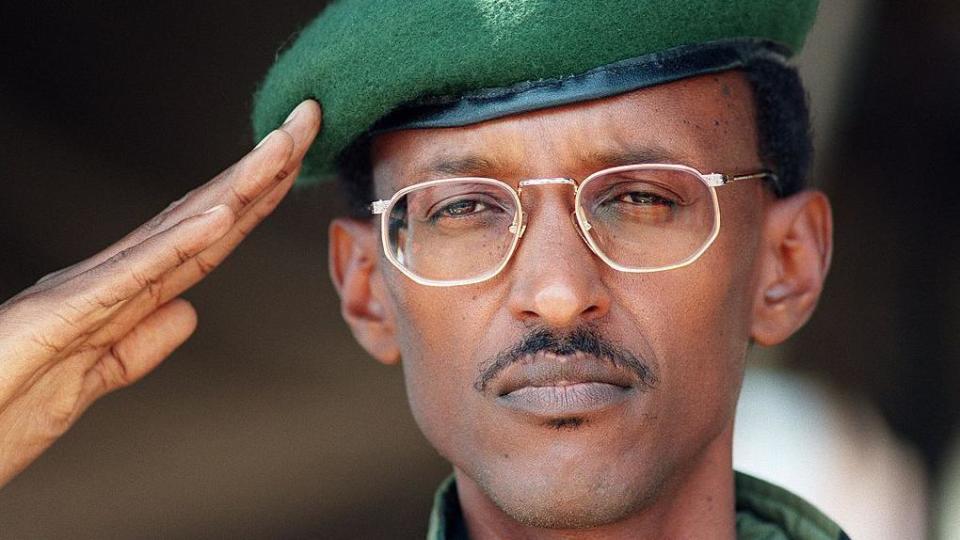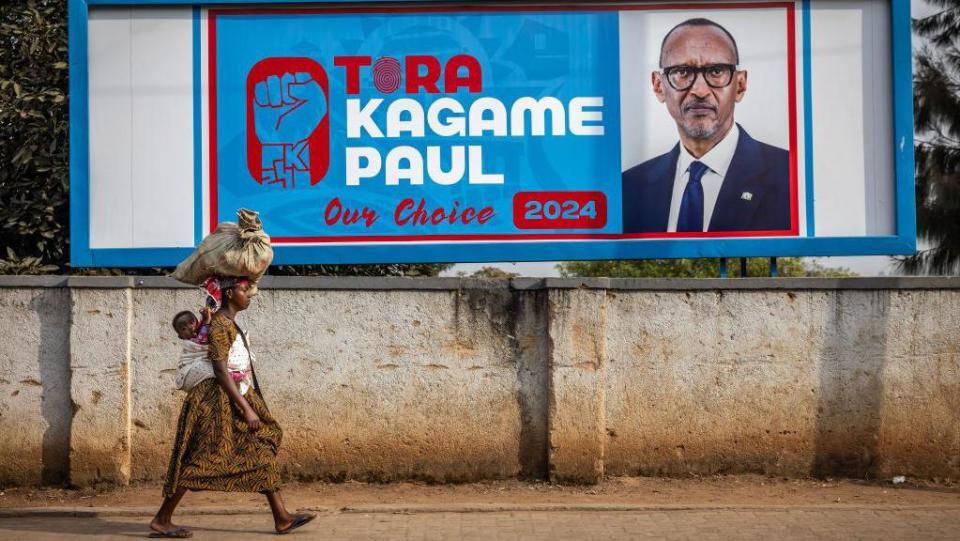There is very little room for improvement in the situation in Rwanda President Paul Kagame in Monday’s elections, after obtaining almost 99% of the votes in the last round.
The scale of his victory in 2017, along with the 95% in 2003 and 93% in 2010, have raised some questions about how truly democratic the elections were.
Criticism that the former refugee and rebel leader confidently rejects.
“There are those who think that 100% is not democracy,” Kagame told thousands of supporters at a campaign rally in western Rwanda last month.
Referring to elections elsewhere, without naming a specific country, he added: “There are many who are elected with 15%… Is that democracy? As?”
What happens in Rwanda is Rwanda’s business, the president insisted.
His supporters agreed, shouting “they should come and learn” as they waved the red, white and sky-blue flags of the ruling Rwandan Patriotic Front (RPF) party.
Standing over 6 feet tall, the lanky 66-year-old father of four cuts a stern, imposing figure in the crowd. He may smile and make a joke or two, but the bespectacled leader can often assume the grimace of a disappointed elder.
His smooth, thoughtful delivery forces the listener to pay attention, and when he speaks, he is usually very direct, rarely mincing words.
Even on occasions when he uses more cryptic or diplomatic language, he will use innuendo to let people know what he is talking about.

Kagame’s life was shaped by the conflict between Rwanda’s Tutsi and Hutu ethnic groups.
To overcome this situation, your government now insists that people identify as Rwandans and not as a specific ethnic group.
President since 2000, he is running for a fourth term, but Kagame has been the true leader of the East African country since July 1994. That was when his rebel army overthrew the extremist Hutu government that orchestrated that year’s genocide.
He initially served as vice president and minister of defense.
Many of his supporters, including some prominent Western politicians, praise him for bringing stability and rebuilding Rwanda after the massacre in which 800,000 ethnic Tutsis and moderate Hutus were killed.
Some accuse his then-rebel army of revenge killings at the time, but his government has consistently stated that these were isolated cases and that those responsible were punished.
The president is not regressive when it comes to criticizing the West, but he also tries to secure its support, sometimes taking the blame for the failure to prevent genocide.
Rwanda was also a partner and financial beneficiary in a now-abandoned UK scheme to send asylum seekers to the country.
“I will vote for PK, of course,” says university student Marie Jeanne, referring to Kagame by his initials.
“Look how well I’m studying. If he wasn’t president, I might not study well, perhaps because of a lack of security,” she told the BBC.
For her, the answer to who she would vote for was obvious, but there are two other names on the ballot that the nine million registered voters must consider.
Frank Habineza, from the Green Democratic Party, and Philippe Mpayimana, from the independent, are running again, in a repeat of the presidential elections seven years ago.
However, last time, they obtained just over 1% of the votes between them.
Other political parties supported Kagame for president.
Opposition politician Diane Rwigara, an outspoken critic of Kagame, was barred from participating on the grounds that she did not present correct documentation, which she dismissed as an excuse to prevent her from running.


Kagame was also accused of silencing, through arrest and intimidation, other potential opponents. He once told Al Jazeera news channel that he should not be blamed for a weak opposition.
Its powerful network of spies allegedly carried out a series of cross-border murders and kidnappings.
They were even said to have targeted their own former boss, former intelligence chief Colonel Patrick Karegeya, who fled Rwanda after falling out with Kagame.
He was murdered in 2014 in his luxury hotel suite in South Africa’s main city, Johannesburg.
“They literally used a rope to hang him,” said David Batenga, Colonel Karegeya’s nephew.
Kagame has done little to distance himself from the assassination, while officially denying any involvement.
“You cannot betray Rwanda and not be punished for it,” he said at a prayer meeting shortly afterwards. “Anyone, even those still alive, will suffer the consequences. Anyone. It’s a matter of time.”
The president’s quest for internal security has led him to send troops to the neighboring Democratic Republic of Congo, saying they are pursuing a Hutu rebel group. Rwanda is also accused of supporting the M23 rebel group – something it denies despite a wealth of evidence, including a recent UN report.
“To be honest, [the election] it’s a scam”, says Filip Reyntjens, reflecting on the research. The Belgian political scientist is an expert on the Great Lakes region.
“Of course I don’t know what will happen this time, but the previous elections were… a circus.
“I mean that the national electoral commission assigns votes instead of counting votes,” he claims, citing the latest European Union (EU) observation mission report from 2003 and the Commonwealth observation mission report from 2010.
Rwanda’s electoral commission states on its website that it conducts “free, fair and transparent elections to promote democracy and good governance in Rwanda”.
“For me, the upcoming presidential elections in Rwanda are not an event,” says Dr. Joseph Sebarenzi, former speaker of the Rwandan parliament, who lost his parents and many family members during the genocide and now lives in exile in the USA.
“The election is like a football game where the organizer is also a competitor, selects other competitors, orders people to watch the game and where everyone knows the pre-determined winner but must behave as if the game were real.”
Kagame, a huge football fan who closely follows English Premier League club Arsenal, would reject this description.


Born in 1957 to a wealthy family in central Rwanda, he was the youngest of five children.
But at just two years old, he became a refugee in neighboring Uganda, fleeing the persecution and pogroms of the late 1950s with his family and thousands of other people from the Tutsi minority.
Despite being just a child at the time, Kagame said he still “remembers looking over the next hill. We could see people burning the houses there.
“They were killing people. My mother was so desperate. She didn’t want to leave this place,” the president told American journalist and unofficial biographer Stephen Kinzer.
These deaths occurred after Belgian colonizers changed the ethnic group they supported to favor an emerging ruling elite from the majority Hutu ethnic group, some of whom had suffered mistreatment during the Tutsi monarchy.
Rwanda gained independence in 1962.
In the late 1970s, Kagame made a series of clandestine visits to his country.
While he was in the capital, Kigali, he visited a certain hotel in Kiyovu, one of the city’s richest neighborhoods. Her bar was frequented by politicians, security agents and civil servants who gossiped while drinking beer after work.
Kinzer wrote that the future leader would listen to conversations while drinking an orange soda, sitting alone at a table and avoiding attention.
These visits to his homeland sharpened his interest in the art of espionage.
He trained in military intelligence in Uganda and joined the successful rebellion in that country, led by Yoweri Museveni, which led to him taking power in 1986. Kagame also trained in Tanzania, Cuba and the USA.
He then led his mainly Tutsi rebel army which marched into Rwanda in 1990.
“[The training] it was useful. Cuba, in its wars with the USA and its connection with Russia, was quite advanced in intelligence matters. There was also political education: What is the fight about? How do you sustain that?” he told Mr. Kinzer.


He sought to sustain the struggle towards economic development – Mr Kagame suggested that Rwanda would emulate Singapore or South Korea and achieve development within a generation.
Although Rwanda fell short of its target of being a middle-income country by 2020, Prof Reyntjens says “this is a well-run country”.
“The problem in Rwanda is political governance, there is no level playing field, there is no space for opposition, there is no freedom of expression, [which] risks undoing the achievements of good technocratic governance.”
But Kagame says the huge crowds of supporters at his rallies are just one example of the trust and love Rwandans have for him and the desire for him to remain their leader, even though he once said he would have prepared a successor by 2017.
Because of constitutional changes, he could, in theory, remain in power in 2034.
“The context of each country” is important, Kagame said in a live interview on state broadcaster last month, addressing the issue of his time in power.
“[The West says]: ‘Oh, you’ve been there a long time’. But that’s none of your business. It’s these people’s business here.”
Thousands of kilometers away in the USA, Dr. Sebarenzi says he does not know what the future holds for his home country, affectionately known as the land of a thousand hills, but adds: “History shows that in countries where the chief If the state is stronger than state institutions, the change of power can become violent, leading to chaotic post-regime periods.”
More BBC stories from Rwanda:


Go to BBCAfrica.com for more news from the African continent.
Follow us on Twitter @BBCAfricaon Facebook at BBC Africa or on Instagram at bbcafrica



































